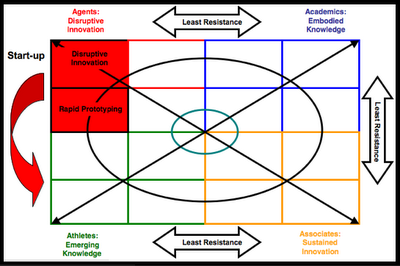Reports from the Knowledge Labs about our recent findings, research topics, and interviews with lifestyle leaders who are creating their own futures.
|
|
| |
How to stimulate your own powers of foresight. Consider the following thought provokers. Ask yourself, in these categories what are the brand new trends and forces? Which are the ones growing in importance? Which current forces are loosing their steam? Which have peaked or are reversing themselves? Which are the "wildcards" about to disrupt us in the future? POLITICAL AND TECHNICAL thought for food: Electronics, Materials, Energy, Fossil, Nuclear, Alternative, Other, Manufacturing (techniques), Agriculture, Machinery and Equipment, Distribution, Transportation (Urban, Mass, Personal, Surface, Sea, Subsurface, Space), Communication (Printed, Spoken, Interactive, Media), Computers (Information, Knowledge, Storage & Retrieval, Design, Network Resources), Post-Cold War, Third World, Conflict (Local, Regional, Global), Arms Limitation, Undeclared Wars, Terrorism, Nuclear Proliferation, Weapons of Mass Destruction, Governments (More/Less Power and Larger or Smaller Scale), Taxes, Isms: Nationalism, Regionalism, Protectionism, Populism, Cartels, Multinational Corporations, Balance of Trade, Third Party Payments, Regulations (OSHA, etc.) Environmental Impact, U.S. Prestige Abroad. SOCIAL AND ECONOMIC Food for thought:
Labor Movements, Unemployment / Employment Cycles, Recession, Employment Patterns, Work Hours / Schedules, Fringe Benefits, Management Approaches, Accounting Policies, Productivity, Energy Costs, Balance of Payments, Inflation, Taxes, Rates of Real Growth, Distribution of Wealth, Capital Availability and Costs, Reliability of Forecasts, Raw Materials, Availability and Costs, Global versus National Economy, Market versus Planned Economies, Generations: Y, X, Boomers, Elderly, Urban vs. Rural Lifestyles, Affluent vs. Poor, Neighborhoods and Communities, Planned or Organic Growth.
Got Knowledge?
|
|
| |
|
|
|
|
The Journal of 2020 Foresight
|
|
| |
|
Thursday, August 17, 2006

Start-up Tribes: Breakpoint Inventors and Commercial Innovators
Chapter Four: The Tribal Territories
By Steve Howard, CKO
The Knowledge Labs
Table of Contents
Chapter One: Basecamp
Chapter Two: The Ridge
Chapter Three: The Outpost
Chapter Four: The Tribal Territories
“There was a strange red glow in the back. He noticed it, but he forgot about it so fast. He though he heard a noise in the engine, though … the engine was making funny sounds. The windshield wipers weren’t working right. They were flying up on Highway 1. Earth was sweating. Sun was peacefully asleep, with her head resting on his shoulder, not a care in the world. She was dreaming.”
Neil Young & Crazy Horse “Greendale”
DOUBLE NICKEL RANCH. In the start-up phase those “Breakpoint Inventors” and entrepreneurs with a new disruptive innovation need people, “Commercial Innovators,” capable of defining and delivering a rapid prototype of the new product category.
Journal of 2020 Foresight: Triggering the path of least resistance, Agent tribes (whom Trailblazer called the “Para-doxy Morons”) look at a well-established, mature market from an offbeat perspective and notice how limited a traditional business model, branch of science, innovation, technology or business model solves a really complex set of problems.
Explorer: What we used to call an AGENT-Agent tribe catalyzes disruptive innovation. “The Breakpoint Inventor” (our newer name) excels at going from 0 to 1. But, it takes somebody else to go from 1 to 1000.
J2020F: And, other tribal combinations, if they survive, to fill in the white space – the blanks on our chart?
Explorer: Yes. They need to turn to the correct combination to manage the “crises at the border” between stages.
J2020F: If they turn to a standalone organization, that someone would have a blend of Agent and Athlete in them – the “Commercial Innovator.”
Explorer: That’s right. And, we’ll see later that they’ll need “more of the green” – more Athletic Tribal members to move the start-up out of its formative stage “box.”
J2020F: Why? Is it that in early survival mode Agents love to find out, in the most creative and inventive way, how to operate and structure their fledgling enterprise– which may not be even clearly defined at the earliest stage?
Explorer: That’s the major reason. This is an organic, entrepreneurial faith driven stage. We all witnessed celebrated cases – during the dot-com meltdown, where high tech organizations populated with a small core of agents discovered to their dismay that the "paradigm shock" associated with their disruptive innovation was too high and the benefit was too low.
J2020F: Why?
Explorer: Typically because applications for the new technology hadn’t been proven – beyond their “new economy cool factor”. This stage, populated by the two types of agents – Breakpoint Inventors and Commercial Innovators -- is the realm of pure science, buggy technology and prototypes.
J2020F: Geeks and nerds only? The ones who thrive on technology-driven speed and independence?
Explorer: While politically incorrect, there is some truth to the stereotype. Only technology enthusiasts are interested. Here’s the rub. Their market niche emerges too slowly for them. In the early stage it is built up around one or more visionaries who see the potential for the new technology and fund the first proofs-of-concept.
J2020F: They evangelize to their trusted circle of friends and opinion makers and entice them to view what they’ve discovered, right?
Explorer: That’s the buzz building stage. It infects early adopters with a compelling vision of the future. The adrenalin rush transfers to the adopters and entices them to join in the organic web of insiders who know about and have to have the newest and greatest.
J2020F: That's how it is suppose to proceed in theory, but what happens more often then not to the "Garage Entrepreneurs?"
Got Knowledge?
Copyright ©2002 - 2006 Aarnaes Howard Associates. All rights reserved worldwide.
6:55 AM
|
|
| |
|
|
|